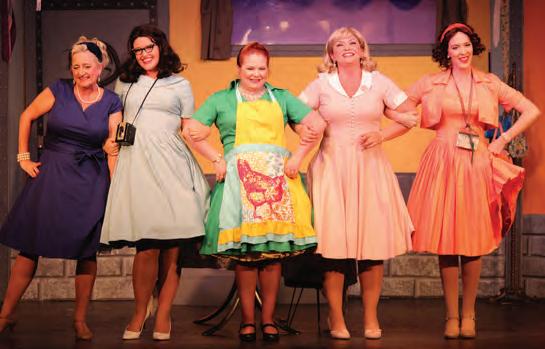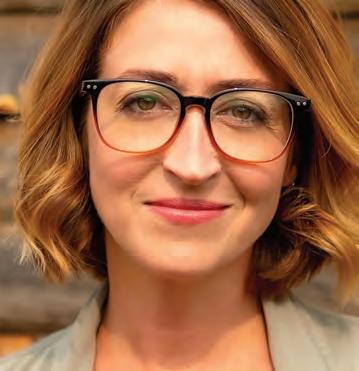
8 minute read
theater – Theatre Conspiracy
From Classics to the Cutting Edge
HEN I WALK INTO the Ned Foulds Theater at the Alliance for the Arts, set design members of Theatre Conspiracy are in the process of turning the stage into the Colorado River. The back of the stage is lined with wooden boats that the actors will use to simulate the 1869 expedition to map the Colorado River and Grand Canyon. Jaclyn Backhaus’s play, Men on Boats, follows a onearmed captain as he manifests destiny in the newly acquired western territory of the United States after the Louisiana Purchase. Since the play opened on October 22, the Foulds Theater has no longer been Fort Myers, Florida, but Arizona in the mid-nineteenth century.
Advertisement
However, Theatre Conspiracy performs everything except the ordinary.
Men on Boats will be performed by an all-female cast. The performance re-imagines this all-male historical expedition with cross-dressing female actors. The stage becomes not only a place that recreates history, but also a place where history is rewritten.
“I founded Theatre Conspiracy with my best friend Bill Gilmore, who was living here at the time. Being young and brash, we wanted to do shows that challenged us, that were a little bit edgy,” Bill Taylor, Founder & Artistic Director of Theatre Conspiracy says as we sit on benches near the outdoor stage. He is the heart of Theatre Conspiracy, its engine. “It felt like a conspiracy against the standard operating of theatre in the area. That’s how we got our name.”
Taylor wanted to change the theatre environment he knew. Despite being a born and raised Floridian, the first performance starred Taylor and Gilmore in a mountain-climbing story called K2. The two friends rented a one room studio and filled it with rented chairs for audience members and constructed the eponymous mountain, K2.
Using plywood, fabric and styrofoam, Taylor and Gilmore made the second-tallest mountain in the world right in the middle of southwest Florida. Taylor and Gilmore hung fabric across the plywood mountain so that as they climbed it, they seemingly disappeared before audience eyes into the fog of K2.
Thirty-six years later, Bill Taylor is still making mountains, rivers, and, most recently, an outdoor stage that served as the performance space for
WTheatre Conspiracy during the pandemic. Taylor, with help from Boy Scout troop members and other Theatre Conspiracy members, constructed a square stage beneath four oak trees. The outdoor space allowed Theatre Conspiracy to continue hosting performances throughout the pandemic and allowed for the invention of checkered seating, where audience members were positioned like pieces on a checkerboard that allowed for social distancing on all sides. Bluegrass concerts, Americana concerts, storytelling, and other performances were all resurrected on this stage during Covid. “It was wonderful,” Taylor ‘Men in Boats’ will be says. “It gave people a sense of normalcy.” If there is something Covid changed, it was how acperformed tors and audiences negotiated space. A performance by an is equal parts audience and actor. Like someone tellall-female ing you their dream, a performance is one side concast, veying a picture and the other side straining to make re-imagining sense of a changing landscape. this all-male “Theatre is a living picture,” Taylor says. historical Theatre Conspiracy is continuing to make space expedition with cross-dressing female actors. The stage for itself on the theatre scene. The performance of Phillip Christian Smith’s The becomes not Chechens in early August only a place kicked off the first perforthat recreates mances back in the Ned history, but Foulds Theatre since the also a place start of the pandemic. where history Smith’s script is set in is rewritten. Russia’s Chechen Republic, when officials were rounding up LGBTQ+ youth and killing them or forcing their families to honor-kill them.
by Caylee Weintraub


The play showcases a family split between ‘religion, politics, or love.’
Theatre Conspiracy’s motto, “from the classics to the cutting edge,” captures the mission of Theatre Conspiracy: to showcase plays with grit. “When I look for a script,” Taylor says, “I look for something to sink my teeth into.” Each performance season, Taylor showcases one classic play, and the rest of the season is reserved for those performances that show some fangs.
Lately, it has focused especially on featuring the works of people of color and women. “One of the proudest moments for me was six or seven years ago when we added onto the mission of the company to produce shows that are geared towards minority artists and minority audiences. We’ve produced The Bluest Eye, by Toni Morrison and For Colored Girls Who Have Considered Suicide, by Ntozake Shange. We’ve committed to producing The American Century Cycle, by August Wilson, which has ten shows, one from each decade of the twentieth century. We produce one each year.”
Actors in Theatre Conspiracy aim to operate against the status quo. Rachael Endrizzi, an actress in the company, described to me her experiences both acting and directing in Theatre Conspiracy productions.
“So many of the productions I’ve gotten to direct here have been real conversation starters,” Endrizzi, who has directed plays such as Almost, Maine and My First Time, writes. “Conversations around tricky topics like terminal illness, addiction to pop culture and media, suicide, gender identity, and more. At the heart of my love for theatre, is my love for storytelling and conversation starting.”
This performance season, Theatre Conspiracy is showcasing four scripts from local writers, four from the state of Florida, and eight from outside the state. Audiences can sit in the Foulds theater and see plays that have only ever been staged in New York.
Theatre Conspiracy shows are dynamic forces geared to showcase diverse experiences. Some of the upcoming performances: an Iowa woman’s experience with a roommate, a man’s use of ecstasy to heal from ‘deep psychological wounds,’ a group of lesbians enjoying a quiche breakfast as part of the Susan B. Anthony Society for the Sisters of Gertrude Stein, and Martin Luther King’s final day in the Lorraine Hotel room the night before his assassination.
Theatre Conspiracy is a shape-shifter, and puts on performances across different centuries, writers, and genres. Just when it seems like Theatre Conspiracy is taking form, it shifts again.
“We’re constantly doing something different,” Taylor says. “Different actors, different playwrights, different places in time.”
Some of the places in time Theatre Conspiracy will enter this performance season ranges from the 1800s, to 1950, to 1968, to current day. “There are individual shows that for one reason or another connect with me the most, but it is the stuff we do here that makes me the happiest,” Taylor says. “One of the actresses in the company told me that when she was a kid, it would have made her happy to see someone who looked like her on stage.” Endrizzi echoes the idea of how theatre can be a powerful experience of finding community. “I was a shy child who was forced into drama class against my will. There, in community theatre, I found a diaspora of loving, creative, giving people who welcomed me with open arms.” Theatre performances are transformative; they transform actors, audiences, and spaces.
Theatre Conspiracy’s next major project, a fringe festival, epitomizes this idea of rapid transformation. Fringe theatre embraces the chaos of constant transformation. Started in Edinburgh, Scotland as a way to stage performances away from traditional theatres, fringe theatre performances embody the nontraditional.
“We have no control over the shows. Writers apply to be in the festival, and then we put all
of those applicants in a hat, shake up the hat, and draw from there,” Taylor says, and smiles. Fringe Festival candidates have 15 minutes to set up their play, 10 minutes to allow the audience to take their places, and then an hour for the performance itself. After the performance is over, the actors have 15 minutes to take all set design down, and Bill Taylor founded Theatre clear the way for the Conspiracy 36 years ago next performance. The “to do shows that challenged us, result is an ever-changthat were a little bit edgy,” ing revolving door of performances. Theatre Conspiracy embraces change: changing stages, changing performances, and changing times. In the midst of embracing change, however, it has also created a stable community. It embraces these paradoxes of new and old, contemporary and classic, changing and constant. When I spoke to actors who are part of Theatre Conspiracy, they echoed the idea of a community and home. “In community theatre, there is a sense of everything being created by a small handful of people, mostly volunteers, and there is something magical about that process,” Endrizzi told me. “I think there is also something incredibly magical about people who are teachers, parents, lawyers, cashiers, etc. during the day, who take their free time in the evenings to come together, to work at creating a play together for their community.” As I come back to Foulds Theatre, I notice the paint marks, scuff marks, and some dents on the surface are vestiges of the performances that have taken place on its surface. The stage is Actor and director, Rachael Endrizzi a palimpsest of experiences layered one on top says, “At the heart of my love of the other. for theatre, is my love for storytelling In the next few weeks, the theatre will be and conversation starting.” transformed into Arizona, and then Iowa, and then Russia. It is a space that crosses time, borders, and experience. “I believe that so many people involved care deeply, and are incredibly skilled and gifted,” Endrizzi says. “They come together in a small group to make something beautiful with the local community right here, for the community right here. I think that’s really, really special.” • Theatre Conspiracy performs at the Alliance for the Arts, located at 10091 McGregor Blvd. in Fort Myers. Fior information, call 939-2787.









